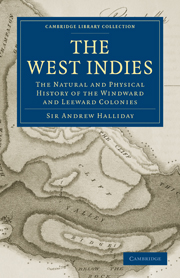Book contents
- Frontmatter
- Contents
- CHAPTER I
- CHAPTER II
- CHAPTER III
- CHAPTER IV
- CHAPTER V
- CHAPTER VI
- CHAPTER VI
- CHAPTER VII
- CHAPTER VIII
- CHAPTER IX
- CHAPTER X
- CHAPTER XI
- CHAPTER XII
- CHAPTER XIII
- CHAPTER XV
- CHAPTER XVI
- CHAPTER XVII
- CHAPTER XVIII
- CHAPTER XIX
- CHAPTER XX
- CHAPTER XXI
- CHAPTER XXII
- APPENDIX I
- APPENDIX II
- Plate section
- Frontmatter
- Contents
- CHAPTER I
- CHAPTER II
- CHAPTER III
- CHAPTER IV
- CHAPTER V
- CHAPTER VI
- CHAPTER VI
- CHAPTER VII
- CHAPTER VIII
- CHAPTER IX
- CHAPTER X
- CHAPTER XI
- CHAPTER XII
- CHAPTER XIII
- CHAPTER XV
- CHAPTER XVI
- CHAPTER XVII
- CHAPTER XVIII
- CHAPTER XIX
- CHAPTER XX
- CHAPTER XXI
- CHAPTER XXII
- APPENDIX I
- APPENDIX II
- Plate section
Summary
The only thing remarkable in the weather for July, 1831, in Barbados, was the unusual quantity of rain; it, indeed, is said to have rained almost incessantly. The trade-winds, however, blew moderately and steadily from the proper quarter, and the atmospheric temperature was uncommonly uniform: the maximum is noted at 86°, and the minimum at 79°.
Towards the end of that month thunder and lightning were of frequent occurrence, and electric clouds hung over the island. In Bridgetown, the 1st of August commenced fine, with light breezes from the north-east, but by nine a.m. the weather had changed, the wind blew strongly, and the remainder of the day was wet and cloudy, and in some parts of the island the thunder was very severe, particularly in the neighbourhood of Chalky Mount, in the district of Scotland, where the lightning shattered a small house, killed a white child, and wounded the mother.
On the tenth morning of the month, it was remarked that the sun rose without a cloud, and shone resplendently through an atmosphere of the most translucent brightness; at six a.m. the thermometer stood at 80°, at eight it rose to 85°, and at ten, to 86°; at which hour the gentle morning-breeze, which had, up to that moment, fanned the country, died away: occasionally, after this, high winds sprang up from the east-north-east, but soon subsided. Calms generally prevailed, with puffs from between the north and northeast points of the compass.
- Type
- Chapter
- Information
- The West IndiesThe Natural and Physical History of the Windward and Leeward Colonies, pp. 32 - 51Publisher: Cambridge University PressPrint publication year: 2010First published in: 1837



